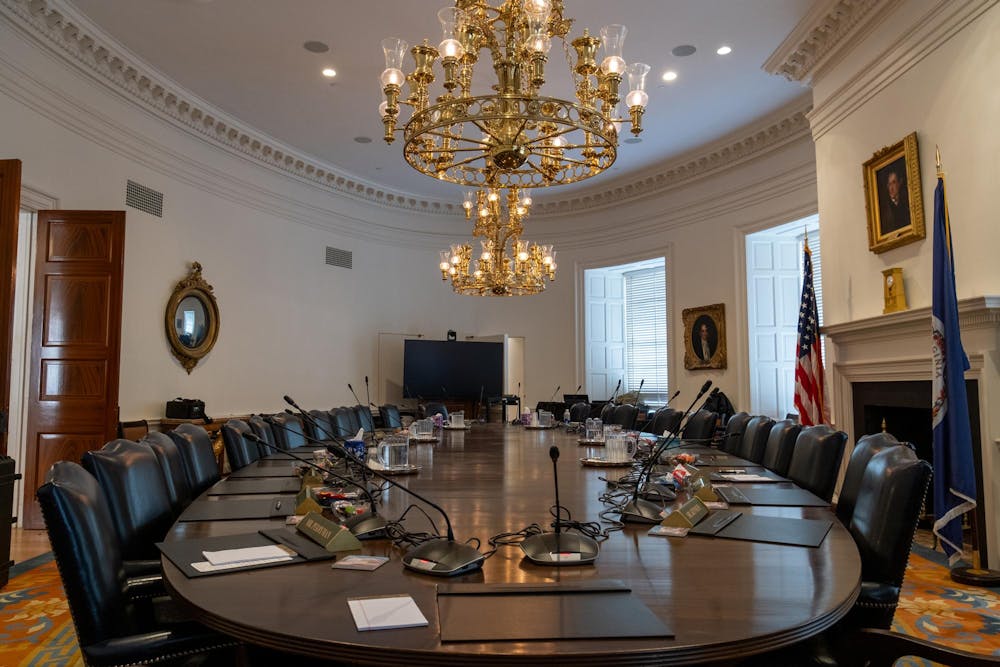The Senate Privileges and Elections Committee’s vote blocking another set of Gov. Glenn Youngkin appointees Aug. 28 leaves five vacancies on the University’s Board of Visitors. Senate Majority Leader Scott Surovell, D-Fairfax, addressed a letter to Youngkin the same day of the Committee’s vote requesting that he suspend making appointments to the three involved university boards — the University of Virginia, George Mason University and Virginia Military Institute.
Surovell’s letter to Youngkin expressed the Senate Democrats’ frustration with Youngkin’s “inappropriate” appointees to the Board.
“The pattern of inappropriate nominations and acquiescence to outside political influence has created significant uncertainty and instability within our higher education system at a time when these institutions need steady, qualified leadership,” the letter reads.
The letter was also signed by Senate President Pro Tempore L. Louise Lucas, D-Portsmouth and Senate Democratic Caucus Chairman Mamie Locke, D-Hampton.
“The Senate has been compelled to reject 22 of your nominees to these critical governing bodies,” the letter to Youngkin reads. “This unprecedented level of rejection reflects not partisan obstruction, but genuine concerns about the qualifications, backgrounds and intentions of your appointees.”
The Committee’s vote rejected James Donovan, John Harris, H. Eugene Lockhart and Calvert Saunders Moore, all of whom were appointed by Youngkin to the Board of Visitors at the end of June and have been serving since then. Ken Cuccinelli, former Virginia Attorney General and class of 1991 alumnus, was also rejected by the Committee in early June.
In addition to the University Board members' rejections, 10 have been blocked at GMU and seven at VMI.
In a statement to The Cavalier Daily, Youngkin expressed frustration with the Committee’s decision to vote down this set of appointees.
“Removing these talented, experienced and dedicated volunteer Board members is an unprecedented breach of public trust. Even more concerning, they refused to provide Virginians with any explanation for their decision,” Youngkin said.
Surovell has previously expressed hope for reforms in the nomination and confirmation process of board members that will emphasize the boards’ commitment to their respective universities first, and the state second.
The letter said that Youngkin’s appointees have contributed “additional controversy” to their respective universities. This summer, pressure from the Department of Justice led to former President Jim Ryan’s resignation. The DOJ similarly pressured GMU’s President Gregory Washington over failure to comply with diversity, equity and inclusion federal laws, although, unlike Ryan, he ultimately received a raise from the GMU Board.
Later in the letter, Surovell requested that Youngkin suspend making appointments to the Board.
“We therefore respectfully request that you suspend further appointments to these boards pending meaningful consultation with Senate leadership,” the letter reads. “Virginia's higher education system is too important to become a casualty of political discord.”
Surovell also mentioned potential reforms to the nomination and confirmation process of university board appointees. He hopes that the General Assembly will make these changes during the 2026 regular session meetings in January.
Specifically, Surovell said that the Senate Democrats hope to pass legislation that disallows board members from sitting on their respective boards until they have been confirmed by the Committee.
“We hope to pass laws that don't allow visitors to sit until they've been confirmed to make it so that no one governor can pick a majority on any board,” Surovell said. “That [way] our universities don't continue to be a political football like our current governor has made them.”
In addition to the Board’s five vacancies, the Committee’s vote leaves GMU’s board with a total of 10 vacancies if it complies with the ruling. With only six sitting members, their board will no longer have a quorum.
However, Surovell said he is not concerned that GMU’s board can no longer meet quorum and therefore cannot take action until the vacancies are filled.
“There’s no action any of the boards need to take legally until they set tuition next year,” Surovell said.
Virginia public universities generally set tuition for the upcoming academic year in the spring, although the exact date varies between universities. GMU publishes their tuition for the upcoming academic year annually June 1.
However, there is an ongoing political standoff over whether the Committee’s vote to block both sets of Youngkin appointees is legal. A judge's ruling July 29 validated the Committee’s vote blocking the first set of eight Youngkin board appointees. Cuccinelli was in this first set of appointees. However, Va. Republicans are in disagreement.
Republican Attorney General Jason Miyares filed an appeal to the judge’s decision, arguing that the Committee’s vote itself does not have the power to speak for the entire General Assembly. The Virginia Supreme Court now has the power to decide whether Youngkin’s appointees can serve while the lawsuit is ongoing.
The Virginia Supreme Court could either stay the injunction, solidifying the judge’s decision, or overturn the decision, allowing the appointees to serve until the case is fully heard. However, the judge said that it is unlikely for the ruling to change. Surovell agreed that the ruling will most likely stand.
“The [Virginia] Constitution is very clear, and the attorney general's arguments were, frankly, nonsensical,” Surovell said. “He basically suggested that we had to follow legislative procedures that we haven't followed in 100 years.”
Virginia’s gubernatorial elections take place in November, with candidates former Rep. Abigail Spanberger (D) and Lt. Gov. Winsome Earle-Sears (R) on the ballot. Whoever is inaugurated in January will have the power to make appointments to fill the boards’ vacancies, pending approval from the Committee.
Spanberger’s press office did not respond to an email request for comment about the Senate Democrats’ decision to block the set of appointees. Earle-Sears’ communications director also did not respond to an email request for comment.







